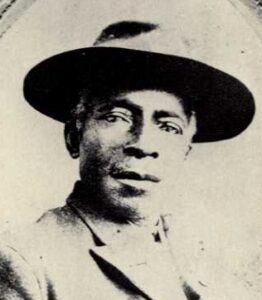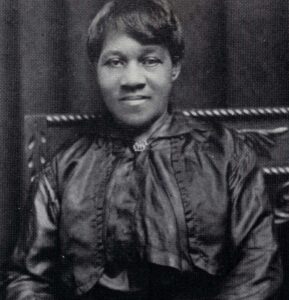YOUR DAILY DOSE OF EUBIE!!!!!
Eubie Blake’s father, John Sumner Blake, was born into slavery on July 7, c. 1838, in Middlesex county, Virginia. Through his life, Blake idolized his father who he viewed as a “man’s man.” His charcoal-dark skin color stood out to the younger Blake, who noted that “My father was a big man, masculine…My father had …. 11 brothers and 1 sister, and during slavery, all of my father’s brothers were big strappin’ men, so they put them into stud. This was in Virginia; see, that’s why I don’t like Virginia … [The men] only got fresh meat, and they only got sugar, preserves, when they were going into stud. … They had everything just like the white people had.” Eubie’s implication, of course, was that the slaves were only treated to such good food when their masters hoped to boost their fertility; otherwise, they were provided just the minimal food for survival.

Blake’s father made no bones about his having been a slave, and proudly showed his son the whip-marks on his back, much to his mother’s chagrin: “My father would show me the stripes on his back. And my mother would say … “John, don’t tell that boy about slavery.” And he’d say, “Yes, he has to know about slavery.” Then he’d turn to me and say to me, “Don’t you hate people,” because he could see the scowl on my face. “The people in the South were almost as ignorant as we were. They thought they was right, and they were told that we were nothing. And a man can only go by his convictions.”
“Everybody, especially colored children, needs to know,” his father would say when Blake’s mother protested his sharing stories of his days in slavery. John Sumner’s acceptance of white people—despite his poor treatment during slavery—and understanding that their prejudice against blacks was based on ignorance had a great influence on the young Blake.
Sometime in the 1840s, John Sumner’s family had relocated to Somerset County, Maryland, on the Eastern Shore, in a town called Potato Neck. The town was populated by free blacks, perhaps suggesting that the Blakes had either purchased their freedom or been freed by their master. By the 1870s, the family owned large plots of land in the area, indicating that the Blake family may have been better off (at least during this period) than Eubie believed. In the 1870 census, the occupations of both John Sumner and his brother James is given as “sailors,” which may reflect the fact that most people living in the area made their living working on the bay oystering.
During the Civil War, Eubie’s father enlisted, working as a “landsman” for the Union Navy in Baltimore. He served a little less than a year, from Nov. 1863-Sept. 1864, supporting vessels sailing out of the Baltimore harbor. He may have already been working on the harbors as this would be his profession throughout most of the rest of his working life.

Blake’s mother—who he variously said was 13-20 years younger than his father—was born Emma or Emily Johnstone in Matthews County, Virginia c. 1856. Although his mother denied being born a slave, Eubie said his father often reminded her that, in fact, she was a slave in everything but perhaps name: ” [She’d say] “I never was a slave in my life.” My father would be back of her, he’d say, “Did you pick cotton?” “Sure I picked cotton!” “Did the master pay you?” “No.” … She never did admit that she was a slave, but she was. She picked cotton and never got paid for it.”
Eubie knew less of his mother’s early life than his father. Much fairer skinned than her dark-hued husband, Emma Blake was an intensely religious person. The 1870 Baltimore city census notes an “Emma Johnstone,” aged 14, who was a “scholar” boarding at the St. Frances Convent and Orphan Asylum in Baltimore. Assuming this was Eubie’s mother, it suggests that she may have been orphaned or at least separated from her parents. The academy had about 25 boarding students (“including two students from Cuba, Spanish children”) and 27 orphans living on site. When Emma was a boarder, the Academy was located in a building on Forrest Street, in the same neighborhood where the Blake family would later live. Living conditions were far better than most black children would have enjoyed at the time, with “light and airy” bedrooms “and a large playground and flower garden surround the institution.” Along with their studies, the girls sang in the school’s chapel choir, gave musical performances, and, on occasion, presented what sound like religious (or at least moral) plays, including “The Youthful Martyrs of Rome.”
By 1880, Census records indicate that Emma and John Sumner were married and living in Philadelphia, along with her brother, George, who was 4 years her elder. Both John Sumner and George’s occupations are listed as “stevedores,” or dock workers, an occupation that John Sumner would follow until ill health caused him to retire sometime around the turn of the century. Emma’s occupation was given as “wash-woman,” which she also would continue to practice throughout Eubie’s youth. Eubie recalled his religious mother singing “Lord, how long do have I got to do this? How long?” as she bent over a washtub, caked with soap, cleaning the “white folk’s clothes.”
Blake was proud of his parents who he viewed as religious, educated, and “respectable” members of society, despite their lack of personal wealth. He was particularly proud of their both being literate, saying his father had beautiful penmanship: “the master’s daughter used to take him down in the woods and teach him to read and write… he could have written calling cards, he had beautiful handwriting.” Blake’s father also was a voracious reader, telling his son, “Everything I ever knew I learned from reading.” He insisted that Eubie learn to read, encouraging him to page through the Baltimore Sun to get the latest news.